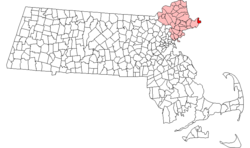Rockport, Massachusetts
| Rockport, Massachusetts | ||
|---|---|---|
| Town | ||

Rockport inner harbor showing lobster fleet and Motif #1
|
||
|
||
| Motto: "A Seacoast Village on Cape Ann" | ||
 Location in Essex County in Massachusetts |
||
| Coordinates: 42°39′20″N 70°37′15″W / 42.65556°N 70.62083°WCoordinates: 42°39′20″N 70°37′15″W / 42.65556°N 70.62083°W | ||
| Country | United States | |
| State | Massachusetts | |
| County | Essex | |
| Settled | 1623 | |
| Incorporated | 1840 | |
| Government | ||
| • Type | Open town meeting | |
| Area | ||
| • Total | 17.5 sq mi (45.4 km2) | |
| • Land | 7.0 sq mi (18.1 km2) | |
| • Water | 10.5 sq mi (27.3 km2) | |
| Elevation | 77 ft (23 m) | |
| Population (2010) | ||
| • Total | 6,952 | |
| • Density | 400/sq mi (150/km2) | |
| Time zone | Eastern (UTC-5) | |
| • Summer (DST) | Eastern (UTC-4) | |
| ZIP code | 01966 | |
| Area code(s) | 351 / 978 | |
| FIPS code | 25-57880 | |
| GNIS feature ID | 0618308 | |
| Website | Town of Rockport, Massachusetts, Official Web Site | |
Rockport is a town in Essex County, Massachusetts, United States. The population was 6,952 at the 2010 census. Rockport is located approximately 40 miles (64 km) northeast of Boston at the tip of the Cape Ann peninsula. It is directly east of Gloucester and is surrounded on three sides by the Atlantic Ocean.
Part of the town comprises the census-designated place of Rockport.
Before the coming of the English explorers and colonists, Cape Ann was home to a number of Native American villages, inhabited by members of the Agawam tribe. Samuel de Champlain named the peninsula "Cap Aux Isles" in 1605, and his expedition may have landed there briefly. By the time the first Europeans founded a permanent settlement at Gloucester in 1623, most of the Agawams had been killed by diseases caught from early contacts with Europeans.
The area that is now Rockport was simply an uninhabited part of Gloucester for more than 100 years, and was primarily used as a source of timber—especially pine-for shipbuilding. The area around Cape Ann was also one of the best fishing grounds in New England. In 1743, a dock was built at Rockport harbor on Sandy Bay and was used for both timber and fishing. By the beginning of the 19th century, the first granite quarries were developed, and by the 1830s, Rockport granite was being shipped to cities and towns throughout the East Coast of the United States.
Rockport had consisted primarily of large estates, summer homes, and a small fishing village while Gloucester was becoming increasingly urbanized. Rockport was set off as a separate town in 1840 as its residents desired a separate enclave with an identity of its own, and was incorporated in 1840. As the demand for its high-grade granite grew during the Industrial Revolution, the quarries of Rockport became a major source of the stone. A distinctive form of sloop was even developed to transport the granite to parts far and wide until the second decade of the 20th century. For many years, there was a large number of residents of Scandinavian descent, dating from the days when Finnish and Swedish immigrants with stone-working expertise made up a large part of the workforce at the quarries.
...
Wikipedia

